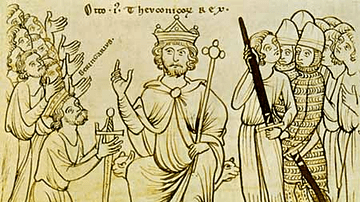Search
Search Results

Article
Sargon and Ur-Zababa
Sargon and Ur-Zababa is a Sumerian poem, date of composition unknown, relating the rise to power of Sargon of Akkad (r. 2334-2279 BCE), founder of the Akkadian Empire. The work is classified as a Mesopotamian folktale, relying on motifs such...

Definition
First Crusade
The First Crusade (1095-1102) was a military campaign by western European forces to recapture the city of Jerusalem and the Holy Land from Muslim control. Conceived by Pope Urban II following an appeal from the Byzantine emperor Alexios I...

Image
Berengar II of Italy’s Submission to Otto the Great
Berengar II (r. 950–961) of Italy submits to Otto I, Holy Roman Emperor (962-973), labelled here as Teutonicorum rex, or King of the Germans, in 964. From the Chronicle of Bishop Otto of Freising (Manuscriptum Mediolanense), unknown artist...

Definition
Declaration of Pillnitz
The Declaration of Pillnitz was a joint statement issued on 27 August 1791 by Leopold II, Holy Roman Emperor (r. 1790-1792) and King Frederick William II of Prussia (r. 1786-1797). The declaration appealed to all European powers to unite...

Definition
Richard I of England
Richard I of England, also known as Richard the Lionheart (Cœur de Lion), reigned as king of England from 1189 to 1199. The son of Henry II of England (r. 1154-1189) and Eleanor of Aquitaine (c. 1122-1204), Richard was known for his courage...

Definition
Jerusalem
Jerusalem is a major holy city for the three Western traditions of Judaism, Christianity, and Islam. It sits on spurs of bedrock between the Mediterranean Sea and the Dead Sea area. To the north and west, it tapers off to the Jezreel Valley...

Definition
Sitting Bull
Sitting Bull (Tatanka Iyotanka, l. c. 1837-1890) was a Hunkpapa Sioux holy man, warrior, leader, and symbol of traditional Sioux values and resistance to the United States' expansionist policies. He is among the best-known Native American...

Definition
German Crusade 1197-8 CE
The German Crusade of 1197 CE, also known as the 'Emperor's Crusade', was led by the Holy Roman Emperor Henry VI (r. 1191-1197 CE). Although the emperor died on his way east, his army did capture Beirut from the forces of the Ayyubid dynasty...

Definition
Orleans Cathedral
The Cathedral of the Holy Cross (Sainte-Croix) of Orleans in the Centre-Val de Loire region of France, was first built in the 13th century CE on the site of a series of older churches dating back to the 4th century CE. The cathedral, which...

Article
Gilgamesh and Huwawa
Gilgamesh and Huwawa is a Sumerian poem relating the expedition of Gilgamesh and Enkidu to the Cedar Forest and the slaying of the monster-demon Huwawa. The work predates and informs The Epic of Gilgamesh in which the death of the monster...